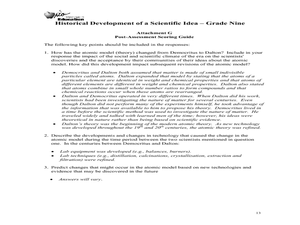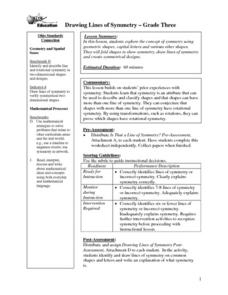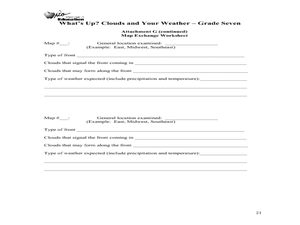Curated OER
Electricity and Lightning
Young scholars define important vocabulary words related to electricity and charges. In this physics lesson, students examine force created by electricity and lightning. They differentiate between the two forces and how they both...
Curated OER
Electricity
Young scholars identify the relationship between batteries, circuits and voltage. In this physics lesson, students investigate the way batteries are put into different apparatus. They discuss why different machinery need different...
Curated OER
I Can Do This! Systems of Equations
Students solve systems of 2-by-2 linear equations using tables,
graphs and substitution. In small groups, classmates work together to discover strategies for solving equations. They use a calculator to graphically represent their answers.
Curated OER
Solving Problems Involving Chords, Radii, Tangents, Secants and Arcs within the Same Circle
Tenth graders apply their knowledge of angles related to a circle, radii, secants, tangents and chords of a circle. They practice using formulas related to a circle. They also apply what has been practiced to real life situations.
Curated OER
Defining Regions
Fifth graders will work in cooperative learning groups to research North American regions and create presentations to share with their classmates. To show what they have learned, 5th graders will create maps of North American regions.
Curated OER
Anticipatory Set Picture Walk
The teacher models a Picture Walk by using a "think aloud" method while reading a picture book to the class. On the second day, 3rd graders use a worksheet as a guide for a second picture walk. This time, students complete the "think...
Curated OER
Historical Development of a Scientific Idea
Ninth graders examine how scientist's contribute to atomic theory. For this development of a scientific idea lesson students work in groups and research the development of the atomic model.
Curated OER
The Scientist in Me
Students make a poster. In this scientist lesson, students define the term scientist, draw pictures of themselves as scientists, and write about what they would study as a scientist.
Curated OER
Energy Levels and Electron Configurations
Twelfth graders investigate the proper filling order of electrons in the energy levels of an atom. They practice how to "read" these occupied energy levels as electron configurations and demonstrate their understanding through creative...
Curated OER
What's My Point?
Sixth graders move through the process of defining persuasion, identifying persuasive arguments and techniques in writing and evaluating their own use of accurate details. Students also define an author's point of view.
Curated OER
Analyzing Sources on Imperialism
Ninth graders explore the concept of imperialism. In this imperialism lesson, 9th graders analyze primary sources regarding British imperialism in Africa. Students analyze the sources for credibility as they gain an understanding of the...
Curated OER
Monologue Preparation
Tenth graders use a published monologue to create three various interpretations featuring different emotions. Following the presentation of the three interpretations to the class, the student will use self-evaluation and audience...
Curated OER
Polymers, Where Are You?
Learners study polymers and what they are used for. In this investigative lesson students view a video on ploymers, and research on the Internet specific polymers and processes.
Curated OER
Science Reproduction
Students discuss the different stages of mitosis. In this biology instructional activity, students work in pairs as they draw and diagram the stages of cell division. They discuss reproduction using pro, meta, ana and telophase.
Curated OER
Fraction Models
Third graders make models of fractions and mixed numbers. Using fraction strips and drawing pictures, 3rd graders develop conceptual understanding of the equivalent forms. Students use the number line to represent and compare...
Curated OER
Cultural Impact of Jim Crow Laws and Civil Rights Movement
Students compare the cultural customs of people from European descent and African Americans between 1900 and 1940. Next students listen to interviews about life during the time of Jim Crow laws, and determine how life might be different...
Curated OER
Energy Extravaganza
Tenth graders study how cells and organisms acquire and release energy through photosynthesis and cellular respiration. They explain that living organisms use matter and energy to synthesize a variety of organic molecules and they will...
Curated OER
Shape Detectives
Students become "shape detectives" as they identify, name, create and describe common shapes within pictures and objects found within the learning environment. Suggestions include incorporating shapes into all learning areas and daily...
Curated OER
Drawing Lines of Symmetry
Third graders explore the concept of symmetry using geometric shapes, capital letters and various other shapes. They fold shapes to show symmetry, draw lines of symmetry and create symmetrical designs.
Curated OER
Clouds and Your Weather
Seventh graders identify clouds and the weather associated with them. They use informational articles and personal weather observations to learn about the relationships between weather fronts and clouds.
Curated OER
Graphs Galore
Fourth graders conduct surveys to collect data. They analyze and interpret the data, then determine which type of graph is appropriate for the data. Students use the data to make predictions, discover patterns and draw conclusions...
Curated OER
Ten Important Hardwoods
Students discuss ten important Pennsylvania hardwood trees, examine characteristics of each tree species, evaluate economic and ecological importance of hardwood trees, and recognize at least two characteristics of each species.
Curated OER
Making a Model Lung
Students explain the parts of the body that are involved in breathing and explore lung function. In this model lung lesson students make a model of a lung then interpret and explain it.
Curated OER
What's Up? Clouds and Your Weather
Seventh graders identify clouds and the weather that is associated with them. In this weather lesson students work in groups and design their own weather map.

























